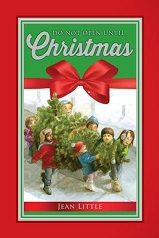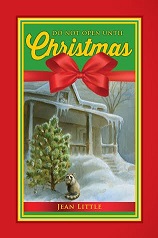| ________________
CM . . .
. Volume 21 Number 20 . . . . January 30, 2015
excerpt:
Christmas is a time when those who celebrate it like to think about warm gatherings with friends and family, jolly elves, bright lights, walks in winter wonderlands, and splendid abundance. For those who have enough food, shelter, warmth and love in their lives to focus on the joy we’ve come to associate with this holiday, it isn’t easy to face the harsh realities some are forced to endure: families torn apart, extreme poverty, death, and the cruelty of being rescued only to find oneself thrust into a situation of even greater pain and hunger than has had to be endured before. But in Do Not Open Until Christmas, these realities are the drivers of the stories Jean Little writes. As the flyleaf for this book says, “The lost sheep are the ones Jean Little cherishes most and they’re the children she writes about.” In eight of the 12 stories, a grim reality is presented. In “The Portable Christmas”, outspoken Holly tells her twin brother, Nick, it’s bad enough they were born on Christmas Day and given the nicknames Prickle and Nickel by their classmates because of a stupid poem recited by their teacher when they were in grade one. But now they have a revolting stepsister—otherwise known as Baby Susie—to contend with, and worst of all, their parents’ divorce is causing the twins to be treated like parcels. “They can’t leave us behind, but they never bother to open us and see what’s inside,” says Holly. In “One of the Family”, Thomas is a foster child who must face the ordeal of leaving the foster mother and home he has become comfortable in to go to a new home where who knows what awaits him. At Christmas time to boot. “Without Beth” tells the story of twins who are very different from one another. Eliza has always relied on Beth to lead the way. Beth knows what to say and when to say it. Beth has great ideas for games. Beth gets the lead in a school Christmas play and is so good in rehearsals she makes the mediocre script sparkle. Eliza is the understudy. She stays in the wings and watches her sister shine and is content with the way things are. Her parents, anxious for her because of her ‘second twin status’, tell her she is just as smart and pretty as her sister. “Stop worrying,” Eliza replies, “I could get along without Beth if I had to.” However, as soon as she says it, she realizes she cannot bear to think about life without her sister. Then, Beth dies, and Eliza must find a way to not only carry on but to step into her sister’s shoes, shoes she doesn’t think she can possibly fill. In “Patrick’s Tree”, Patrick Fisher is a boy who was abandoned by his mother when he was four-years-old and was left with his grandparents. He loves his grandparents dearly. Though they aren’t well off, he shares good memories of Christmases with them, especially the fun they had decorating a small ceramic tree. But this Christmas, his grandfather lies languishing in a hospital bed, unable or unwilling to get better after having suffered a severe stroke. Though she is trying to do her best to cover up her own anguish, his grandmother is suffering, too. As if that wasn’t enough to have to handle, Patrick’s mother suddenly shows up, treats Patrick like a baby, and spills all her troubles onto his young shoulders. “When Gabriel was little and her world was a happy place, she loved listening to Mom’s stories about her own personal guardian angel, who came to her rescue when she was in a fix.” Gabriel wanted to believe she, too, had her own personal angel. When she was seven, her younger brother, Michael, was born, and her father lost his job. Michael turned out to be unable to walk or do things other children could, and could not seem to learn. Gabriel had seen the life in his eyes and knew he could, but neither of their parents knew what to do with him. Eventually, they took him to a doctor and were told Michael had cerebral palsy. Mrs. Lighthart, a therapist, came to the house to work with him, and Gabriel joined in with the therapy, helping her brother play games and use things the therapist introduced between her visits. However, Gabriel’s father grew impatient with the efforts and told Mrs. Lighthart not to come back. Then he left them all for good. Gabriel’s mother did not know how to cope, and the family sank into abject poverty. Now, it’s Christmas, and Gabriel’s mother is in a state of total apathy after having been punched in the face by a man with whom she has an abusive relationship. Their shelves are completely bare, the Food Bank is closed, her mother has used tissues, other garbage, a lipstick and exactly three lifesavers in her purse, and Gabriel’s Angels are nowhere in sight. Perhaps the harshest story is that of Scrap, an urchin who lives on the ugly streets of 19th century London and is rescued by a real-life figure, Dr. Barnardo. When he is found by Dr. Barnardo and an older boy named Tim Jenks after midnight on a freezing Christmas Eve, Scrap is terrified. In 19th century London, Dr. Barnardo was a man who rescued indigent children from the streets, fed, washed and clothed them, and later sent them off to Canada where they would ‘have their chance’ by working for farmers who needed help and wanted children. Sadly, many of the boys who came to Canada believing they would start a life where, in return for their labour, enough food, adequate shelter and even appreciation would be the order of the day, discovered their supposed benefactors were nothing more than slave drivers who beat and otherwise abused the boys so that they suffered as much or more than they had in their former lives. In Jean Little’s story, Scrap, the scrawny nine-year-old who looks no more than five finds himself in just such a fix. So what makes these hard realities appropriate material for Christmas stories for young readers? The spirit of Christmas is love. It’s about faith, and hope, and giving. In each of these stories, there is love. There is also faith, hope and giving. In each of these stories, the children are resourceful beings who fight for what is truly meaningful. In some cases, there is help from loving adults, but it’s the children who take the initiative to resolve the problems they’re faced with. Some of the stories, such as A Present for Miss Potton, The Boy Who Didn’t Believe in Christmas, How Barney Saved the Day, and Do Not Open Until Christmas are primarily didactic tales. Though the lessons are clear, the characters are not well-developed and are difficult to connect with. In these stories, there are some surprising twists that may give young readers new thoughts. But this reader thinks it is in relaying the darker realities of life while imbuing those suffering them with the hope and resilience necessary for life to continue and even to flourish that Jean Little’s prose shines. She makes readers believe in guardian angels after all. Recommended.
Jocelyn M Reekie is a writer, editor and publisher in Campbell River, BC. www.jocelynmreekie.com
To comment on this title or this review, send mail to cm@umanitoba.ca.
Copyright © the Manitoba Library Association. Reproduction for personal use is permitted only if this copyright notice is maintained. Any
other reproduction is prohibited without permission.
CM Home |
Next Review |
(Table of Contents for This Issue - January 30, 2015.)
| Back Issues | Search | CM Archive
| Profiles Archive |

